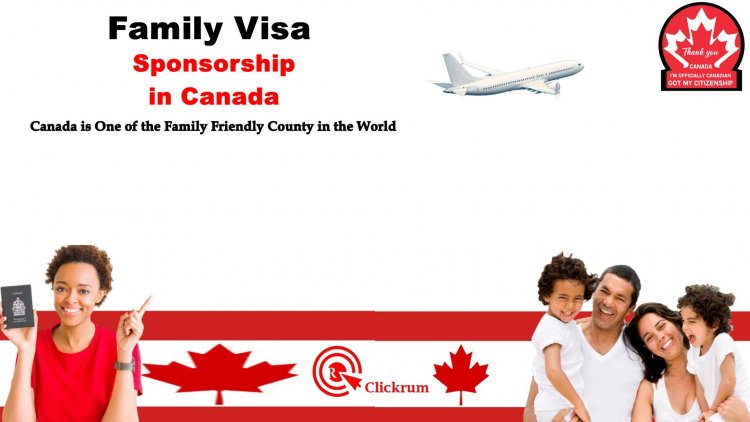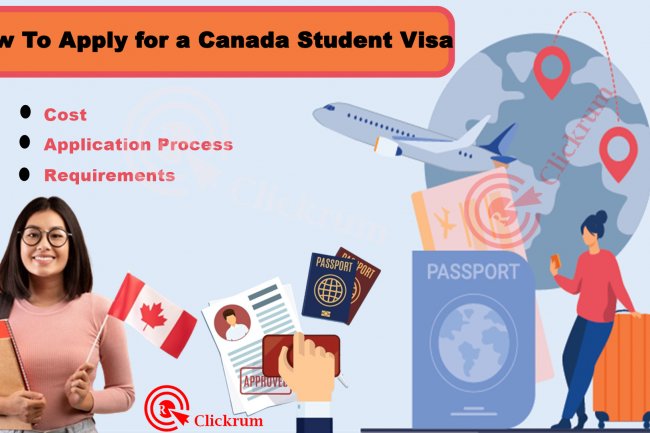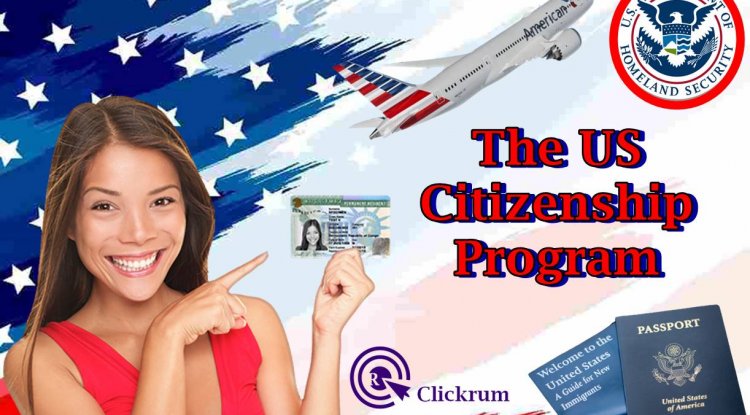Apply Now for the Family Visa Sponsorship Program in Canada!
Are you or someone you know in the process of immigrating to Canada? To make the immigration process easier, Canada has created the Family Visa Sponsorship Program, which allows certain close family members to come live with their sponsors in Canada. In this article, we’ll cover how to apply for the Family Visa Sponsorship Program in Canada and what documents you need to submit with your application.

The Family Visa Sponsorship Program in Canada allows families to reunite more easily, by sponsoring family members to come live with them. If you are related to someone currently living in Canada, you may be eligible to sponsor them under this program. Whether it’s your parents, siblings, or even your spouse and children, this program has something for everyone! Check out these simple steps on how to apply now for the Family Visa Sponsorship Program in Canada!
The Family Visa Sponsorship Program in Canada allows you to sponsor your family members to immigrate to Canada if they need one or more of the following immigration services provided by Immigration, Refugees and Citizenship Canada (IRCC): permanent residence visas (PR), study permits, work permits, and protected person processing. Applicants who are eligible to apply under this program are immediate family members of Canadian citizens or permanent residents of Canada (living in Canada or abroad). If you have immediate family members living abroad who need immigration services from IRCC, learn how you can apply for the Family Visa Sponsorship Program in Canada today!
What is Canadian Family Sponsorship?
If you are a Canadian citizen or permanent resident, you can sponsor your parents, grandparents, spouse or common-law partner, children, and some extended family members to become permanent residents of Canada. If you are a dependent child living abroad with your family but not under one of these categories above, you may still be eligible to immigrate as an adult if at least one of your parents is a Canadian citizen or permanent resident.
Canada offers sponsorship programs for permanent residents or citizens of Canada that wish to bring their loved ones to Canada. These programs allow certain family members to become permanent residents of Canada. One of the most popular streams of Canadian immigration, family sponsorship programs makes it easy for citizens and permanent residents to bring their spouse and immediate family members to Canada with reduced processing times because Canada knows that family should never be put on hold.
There are two main aspects to sponsorship:
- It allows your family member to immigrate to Canada and get permanent residence (PR).
- It requires you, as an individual, to make a commitment to provide for basic needs and to support that person financially.
The interest to sponsor form
After you have submitted an Expression of Interest (EOI) and completed a profile of your proposed Canadian family sponsorship, you must then submit an application for sponsorship under one of three categories: spouse, common-law partner, or dependent child.
As part of that application process, your Canadian relative who is already living in Canada will have to provide biometrics (i.e., fingerprints and photos). The same documents will be required at that time as were requested as part of your original EOI.
Do I need a job to sponsor a family member?
You don’t need a job to sponsor a family member, but you do need a steady income. If you have some money saved up and your spouse or partner has a job, it’s likely that you can afford to cover basic expenses while they live with you. If your spouse or partner doesn’t have a job lined up yet, they will need to prove they can support themselves once they move to Canada.
For example, if their language skills are weak or employment opportunities are limited in their country of origin, then it will be very difficult for them to find work once they arrive. Therefore, it’s important that your partner prove how they plan on supporting themselves before Immigration will consider them as part of an application.
How long does sponsorship take?
Family Visa Sponsorship Program in Canada - How to Apply to apply now. In most cases, it can take between 6 and 8 months from submission to approval. The time varies based on: where you are living if you need more documentation or information and if your application is eligible for processing priority review (see below).
When your sponsor has submitted an application under a category that is eligible for processing priority review, USCIS will do one of two things: If you have given USCIS all of the required documents and information they need to process your case, they will process it quickly so that you can receive a decision within 30 days of your completed application being received by USCIS.
What other options do I have to bring my family member to Canada?
There are other options to bring family members to Canada, but they aren’t as straightforward. If you aren’t a Canadian citizen or permanent resident and want to sponsor your spouse, common-law partner, or conjugal partner, they will have to meet one of these requirements: prove that they are not able to support themselves; have skills that can help contribute to Canadian society, or be accepted into a program at a post-secondary institution (if they plan on studying).
If your family member doesn’t qualify under one of these categories, you might consider looking into other avenues. For example, if your family member is facing dangerous conditions due to armed conflict or natural disaster in their home country, you could apply for them through a refugee program.
Canadian sponsorship background check
As part of your application, you must provide documents to prove that your relationship with your spouse, common-law partner, or conjugal partner is genuine and continuing. If a child is included on your application and will be living with you in Canada, you must also provide documents to prove that: The child has been adopted abroad.
Or A custody order exists for the child (in countries where it's not common to grant custody rights to same-sex couples, single parents may have difficulty obtaining custody); or You’re recognized as a parent by either: An adoption order issued by a government; or By proof of prolonged care and support of the child; For details on what kind of proof we accept, check out Family Unification Checklist.
Canadian sponsorship biometrics
If you’re already a Canadian citizen or permanent resident who wants to sponsor your family member, you must pay a processing fee, schedule an appointment, and provide biometrics (fingerprints and photos). Your family member may need to attend an interview. Find out more about biometrics. This page explains how to apply as a sponsor.
Canada requires most immigration applicants to provide biometrics. Use Canada’s online tool to find out if you need to give your biometrics. After paying your biometric fee when submitting your application, you will receive a letter from IRCC with instructions on how to provide your biometrics.
Canadian sponsorship medical exam
The first step of applying to sponsor a spouse, common-law partner or dependent child is getting them an invitation to apply (ITA) to enter Canada as a permanent resident. This means they’ll need to get a medical exam before they can complete their application. In fact, it's possible that they might not even be able to book an appointment with Immigration, Refugees, and Citizenship Canada (IRCC) or one of its visa offices until you submit all your supporting documents.
So make sure you have your medicals done and verified by IRCC before sending off any forms. Your partner or family member will likely need x-rays, lab tests, and an eye exam. Depending on their age, sex, and health history, some applicants may also require additional vaccinations.
Family Sponsorship
If you are a Canadian permanent resident or citizen with a family member who wants to immigrate to Canada, you may be able to help them become a permanent resident. Family reunification remains one of the pillars of the Canadian immigration system.
To be eligible, the person seeking sponsorship must be a:
- Spouse, common-law, or conjugal partner
- Dependent child
- Parent
- Grandparent
- Sibling, nephew, niece, or grandchild under 18 years who is unmarried and whose parents are deceased
The person sponsored must live outside Canada, unless they are residing legally in Canada temporarily, for example with a work or study permit.
What is a Spouse/Partner?
To apply as a spouse or partner, you must be 18 years of age or older and not have previously been married. You may be married to your sponsor or be common-law partners. (This is defined as a couple who has lived together in a conjugal relationship for one year or more) Marriage or common-law partnership must have existed prior to making an application under these classes. You cannot marry just to become eligible to immigrate to Canada. If you have been married before, only your current marriage will be considered when deciding if you are eligible to immigrate to Canada on a spouse/partner basis.
- Spouse: legally valid marriage in country of origin and under Canadian law
- Common-law partner: At least 1 year of uninterrupted cohabitation in a conjugal relationship
- Conjugal partner: Conjugal relationship for at least 12 months (permanence and commitment similar to marriage or common-law) where the couple is prevented from living together due to immigration barriers, religious reasons, sexual orientation, or marital status (e.g. married to someone else, where divorce is not possible in the country of origin)
- Same-sex relationships: considered valid for immigration purposes under these categories
What is a Dependent Child?
Under Canadian immigration law, a dependent child is one who is either: under 19 years of age; or between 19 and 25 years of age and enrolled in full-time study at a recognized post-secondary institution. Additionally, a child will also be considered a dependent if he or she has depended on financial support from a parent before turning 22 years old and still depends on that same financial support while pursuing post-secondary education.
To apply for sponsorship as a family member under Canadian immigration law, you must first be found eligible to sponsor someone by Citizenship and Immigration Canada (CIC). The sponsor must have been living with you as your spouse or common-law partner immediately prior to making their application.
Who can Sponsor?
A sponsor must be an adult Canadian permanent resident or citizen over the age of 18. A sponsor must reside in Canada unless they are a citizen currently living abroad and planning to reside in Canada once the sponsored individual arrives.
An individual may not sponsor if they:
- Are in prison
- Are subject to a removal order
- Are in the process of bankruptcy
- Receive social assistance from the government (except for disability)
- Have been convicted of (or attempted/threatened to commit) an offense of a violent or sexual nature, or
- resulting in bodily harm to a family member
- Have failed to pay child support payments
- Have failed to pay back immigration loans, or have made late or missed payments
- Have sponsored a family member in the past and failed to meet the terms
- Have sponsored a previous spouse or partner who has not been a permanent resident for more than 3 years
- Were themselves sponsored and became a permanent residents less than 5 years ago
How many relatives can I sponsor to Canada?
There is no limit to the number of eligible family members a Canadian permanent resident or citizen can sponsor. However, applicants must submit separate applications for each eligible family member sponsored.
Can I sponsor my brother or sister to come to Canada?
Sure you can. If you have a Canadian sibling, parent, or child living with you at home, you’re eligible to apply for sponsorship under Canada’s Family Sponsorship category.
The family member will need to prove they have enough money to support themselves upon arrival—and that they plan on living with you—but otherwise, your Canadian family ties are good enough reason to sponsor them into your home country.
Can I sponsor my fiancé to come to Canada?
Yes. If you are a citizen or permanent resident of Canada and your fiancé lives outside of Canada, you can sponsor him or her to immigrate to Canada as a permanent resident. To apply for a sponsorship certificate, you must: meet eligibility requirements such as language proficiency and financial capacity; and pay an application fee ($150).
The Department will only issue one (1) sponsorship certificate per family relationship; therefore, if one member is already a Canadian citizen or permanent resident, that person cannot also sponsor another family member. For example, if Mr. Smith is sponsoring his wife who is currently living abroad, he cannot also sponsor his brother at the same time.
Can I sponsor my boyfriend or girlfriend to come to Canada?
As of November 5, 2014, if you are not married or a common-law partner, you cannot sponsor your partner’s entry to Canada. To be eligible to sponsor a partner who is not your spouse or common-law partners, such as a fiancé(e) or conjugal partner (who is not your spouse), you must be 18 years of age or older and reside in Canada.
Your relationship with your partner must also be genuine and continue to exist until after they become a permanent resident. For more information on sponsorship eligibility requirements, see Family class on our website.
Can I sponsor my friend to come to Canada?
Yes, but it's not as simple as sponsoring a relative. You can apply to sponsor a friend or a family member who is already living in Canada if you are 18 years of age or older and have been living in Canada for at least one year. If your application is approved, you must be able to support your friend or family member financially (e.g., through employment income) and accommodate them by providing housing, meals, and some day-to-day necessities while they settle into life in Canada.
A sponsorship relationship requires shared responsibilities and both parties are expected to cooperate with one another until their obligations under their agreement have been met. At that point, your sponsorship obligations will end; however, you can continue your friendship should you wish to do so.
Other Requirements
However, we are going to list some requirements for your family visa sponsorships programs. These requirements are meant for you to follow to be eligible for the sponsorship program.
Here are they:
1). Fees
The Canadian government requires payment of sponsorship and processing fees for Family Class applications. Additionally, there is a “Right of Permanent Residence Fee” for every sponsored relative who is not a dependent child – this is the only fee that will be refunded if the application is withdrawn or refused.
Family Member Fees ($CAN) Total Fees/Person ($CAN)
Spouse, partner, or relative age 22 or older – Sponsorship fee ($75)
– Processing fee ($475) $1,040
– Right of permanent residence fee ($490)
Relative under age 22 and not your dependent child – Sponsorship fee ($75) $640
– Processing fee ($75)
– Right of permanent residence fee ($490)
Dependent child, adopted child, or orphaned relative – Sponsorship fee ($75) $150
– Processing fee ($75)
2). Sponsorship Agreement
To sponsor your family member, you must enter into a sponsorship agreement with Immigration, Refugees, and Citizenship Canada (IRCC). The agreement outlines your obligations as a sponsor and that of your family member(s). You must agree to provide financial support to your family member(s) and guarantee that they will leave at any time if IRCC decides it is not safe for them to stay.
You must also agree to notify IRCC if there are changes in your situation that affect your ability or willingness to meet these obligations. The signing of the undertaking commits both you and your family members to its terms. If you do not follow through on any part of it, IRCC can deny entry, revoke permanent residence status or even remove someone from Canada.
- Spouse, common-law, or conjugal partner: 3 years
- Dependent child: 10 years OR when the child reaches age 22 (whichever comes first); 3 years for a dependent child over age 22.
- Parent or grandparent: 20 years
3). Medical exam
Last, you’ll need to pass a medical exam. A public health doctor will review your results, and if everything looks good, your application will be submitted to a visa officer at Citizenship and Immigration Canada (CIC).
Assuming there are no issues with your medical exam or paperwork (which is rare), you should hear back from CIC within two weeks. You may then move on to the next step in becoming a permanent resident of Canada: getting an approval letter from CIC.
4). Police Certificates
If you have been convicted of a crime or been arrested, even if never charged with a crime, there is no way around it; you must produce police certificates from every jurisdiction where you’ve lived over the past five years. If you don’t know where your certificates are, ask your lawyer or local police.
Once you have them all together, take them to someone authorized to certify copies—often notaries can do so; get several certified copies of each one and bring those to your visa interview.
5). Sponsoring a family member in Quebec
In Quebec, you can sponsor a family member through two methods: sponsoring a spouse or partner (the Quebec Experience Class program), or applying to sponsor other family members, including your parents, grandparents, and adult children.
The first method, called Bringing Your Family to Live with You, requires that you have been living in Quebec as a permanent resident for at least one year and that you meet certain financial requirements. The second method, called Sponsoring Other Members of Your Family, can be completed by those who have lived in Quebec for less than one year.
6). Quebec Requirements
You must have been married to a Canadian citizen or permanent resident for at least 12 months; both you and your spouse (or common-law partner) must be at least 18 years old, have proof of income, and have no criminal record.
Your sponsor must file an application with Immigration, Refugees, and Citizenship Canada (IRCC) on your behalf within two years of your marriage. You'll need to prove that you can support yourself and that you'll live with your sponsor.
What is the income requirement for Canadian family sponsorship?
In order to sponsor your family member(s) in Canada, you must have a minimum of $24,600 CAD per year. Your annual income will be calculated using 12 months of recent (within 60 days) pay stubs or a letter from your employer verifying your income.
If you are self-employed or freelance, you may include profit and loss statements and balance sheets as proof of income. The minimum amount is subject to change but is always available online on our website.
How can I be eligible to sponsor a family member?
To sponsor a family member, you must meet minimum eligibility requirements. Eligible sponsors must:
- be a Canadian citizen or permanent resident
- be at least 18 years old
- live in Canada, or plan to return to Canada once your spouse or partner becomes a permanent resident of Canada
- be able and willing to provide for the basic financial needs of your family member for three years
Who isn’t eligible to sponsor a relative?
There are some cases in which a permanent resident or citizen is not eligible to sponsor. If one of the below scenarios apply, a sponsor may be ineligible if they:
- are currently in prison
- have not paid alimony or child support payments
- have declared bankruptcy and are not yet released
- received social assistance for reasons other than a disability
- failed to pay back an immigration loan, made late payments, or missed payments
- have previously sponsored another relative and failed to meet the terms of the sponsorship agreement
- have been convicted of a violent crime, any offense against a relative, or any sexual offense, depending on details of the case
Is there a deadline for Canadian sponsorship applications?
Yes. If you plan to immigrate to Canada and have a Canadian citizen or permanent resident family member who would like to sponsor you, there is a deadline. Family members are required to submit an application before they become a landed immigrant or citizen, as per these rules.
The sponsors must apply within two years of becoming eligible for sponsorship. If they fail to do so, that status will be revoked, although it may be reinstated if extenuating circumstances prevent them from doing so earlier.
Is there an age limit for sponsorship in Canada?
No, there is no age limit for sponsorship in Canada. However, if you’re between 18 and 24 years old and want to sponsor your spouse or partner, you must prove that you will not be a burden on social assistance. You’ll need to provide proof of employment income and/or an estimate of future employment income. More details are available from CIC—visit their website at www.cic.gc.ca under Sponsorship of Parents and Grandparents.
Recommended Articles:
FAQs
What is Family Class Sponsorship?
Your relatives can live, study and work in Canada if they become permanent residents of Canada. You can sponsor certain relatives to come to Canada if you’re at least 18 years old and a:
- Canadian citizen or,
- a person registered in Canada as an Indian under the Canadian Indian Act or,
- permanent resident of Canada
Canada Family Sponsorship Process
If you are a Canadian citizen or a permanent resident of Canada, age 18 or over, you can sponsor certain family members to become Canadian permanent residents. If you become a permanent resident, you can live, study and work in Canada. If you sponsor a relative to come to Canada as a permanent resident, you are responsible for supporting your relative financially when he or she arrives.
Once the IRCC has received your PR immigration application, you will receive an Acknowledgment of Receipt also known as an AOR. This AOR is a confirmation that your application file has been created. You may also be referred to as an "AOR date" which is the date from when your 6 months intended processing time begins.
Requirements to be a Sponsor
To be a sponsor:
- You must be 18 years of age or older.
- You and the sponsored relative must sign a sponsorship agreement that commits you to provide financial support for your relative, if necessary. This agreement also says the person becoming a permanent resident will make every effort to support her or himself.
- You must provide financial support for a spouse, common-law or conjugal partner for three years from the date they become a permanent resident.
- You must provide financial support for a dependent child for 10 years, or until the child turns 25, whichever comes first.
Who You Can Sponsor
You can sponsor:
- Spouse – Outside, Inland, Same-Sex
- Common-Law partner – (restrictions apply)
- Conjugal partner – (restrictions apply)
- Dependent children
- parents – (Additional conditions apply)
- grandparents – (Additional conditions apply)
- brothers or sisters, nephews or nieces, granddaughters or grandsons who are orphaned, under 18 years of age and not married or in a common-law relationship
- another relative of any age or relationship but only under specific conditions
- accompanying relatives of the above (for example, spouse, partner and dependent children).
Sponsoring Your Spouse
The Spousal Sponsorship program is a subsection of the Family Class immigration category. Under this program, a Canadian citizen or permanent resident may sponsor a spouse or common-law partner for Canadian permanent residence. Both the Canadian citizen or permanent resident (also called the 'sponsor') and the foreign national (the 'sponsored person) must be approved by Immigration, Refugees and Citizenship Canada (IRCC) in order for the sponsored person to receive a visa.
In order to receive a visa through this immigration program, the sponsor and sponsored person must prove that their relationship qualifies under one of three categories: Spouse Common-law Partner Conjugal Partner Canada does recognize same-sex couples to be eligible for spousal sponsorship. Inland sponsorship is when the couple is together in Canada and the foreign spouse/common-law partner has temporary status in Canada, either as a worker, student, or visitor. An Outland application is generally pursued when the sponsored partner is living outside of Canada.
Sponsoring Your Child
Dependent children, both natural and adopted, may be sponsored to live with their parent(s) as permanent residents in Canada. The child sponsorship program is a subsection of the Family Class of immigration. To receive a visa through this immigration program, the sponsor and the sponsored person will be required to prove their relationship to one another. Individuals whose adoption proceedings are in the final phases of processing may begin sponsoring their child before the adoption has been finalized.
What If My Sponsorship Application is Refused?
If your application for sponsorship is refused, you can appeal the case to the Immigration Adjudication Division (IAD) within 30 days of the refusal. IAD appeals are lengthy, costly and by no means guaranteed. If your case was refused, you should contact a lawyer immediately in order to ensure your appeal is filed on time.
What Does “Essential Needs” Mean?
When agreeing to provide for a family member’s “essential needs”, the sponsor must take care of basic requirements of everyday living (eg. food, clothing, shelter), and health needs not covered by public health services (eg. dental and eye care)
How Long With The Sponsorship Application Process Take?
This will depend on to which Canadian Immigration Visa Office the application was forwarded, and the type of family member sponsored. Spouses, common-law partners, and dependent children are priorities and can take about a month, whereas parents and grandparents can take more than three years.
Who can be included in the sponsored person's application for a Canada immigration visa?
Under family sponsorship programs, the following individuals can be included in the sponsored person's application for a Canada immigration visa:
- The spouse, common-law partner, or conjugal partner of the sponsored person
- The dependent children of the sponsored person
- The dependent children of the sponsored person's spouse, common-law partner, or conjugal partner
- The dependent children of the sponsored person's dependent children
- The dependent children of the sponsored person's spouse, common-law partner, or conjugal partner's children.
How much money do I need to sponsor a family member in Canada?
The income required will vary depending on the type of sponsorship you undertake and the number of family members you already have in your care. You will be required to sign a promise to provide for the basic needs of the family member you are sponsoring.
Some sponsorship options will also require you to demonstrate that you have a minimum income in order to be eligible to sponsor. This is for instance the case with the Parent and Grandparent Sponsorship Program.
You must exceed the Minimum Necessary Income (MNI) requirement set by Immigration, Refugees and Citizenship Canada (IRCC) for each of the past 3 taxation years before the date that you submit your application. Your MNI is assessed based on your Canada Revenue Agency Notice of Assessment. Sponsors living in the province of Quebec must meet different income requirements.
What does “basic needs” mean?
The sponsor must undertake to provide the sponsored family members with:
- food, clothing, shelter, and other necessities of life
- dental and eye care and other health need are not covered by public health services available to all Canadian citizens and permanent residents.
- The obligation to provide for the basic needs of the sponsored person(s) will only arise if the sponsored person(s) are unable to provide for these needs on their own.
Can I sponsor my same-sex partner?
Yes. Your spouse, common-law partner or conjugal partner can be of either sex.
Is Will marrying a Canadian automatically give the foreign spouse permanent residence in Canada?
No. Once you are married or in a common-law relationship, you can then apply for a spousal sponsorship. The married spouse will only become a permanent resident of Canada after your sponsorship application is approved.
How do I apply for family sponsorship?
To apply to sponsor your relative, you must go through the following steps:
- Get the application package from the government website and read the instruction guide, fill out the forms.
- Pay your application fee (including processing fees, biometrics and third-party fees).
- Send your application to the mailing address indicated in the application guide.
How long will my sponsorship application take?
- Spousal sponsorship applications take approximately 12 months to process.
- The processing of applications for dependent children varies by country.
- The processing of PGP applications takes between 20 and 24 months.
Conclusion
A family sponsorship application is a very detailed, time-consuming process. We'll walk you through all of your options and help you decide which is best for your family's situation. Our team of experienced immigration professionals can also help navigate you through each step of your sponsorship application. If you're interested in learning more about how to apply now, give us a call today!













